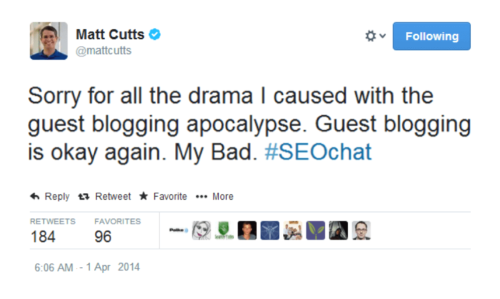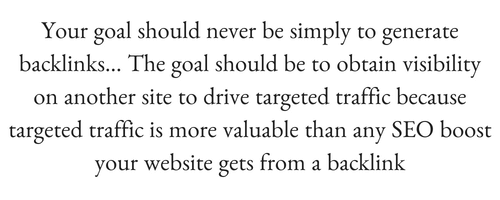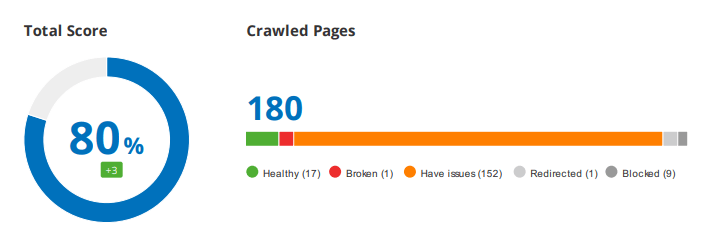SEO is back! That’s at least what we’re seeing as headlines in the digital marketing world now that people are seeing Facebook organic reach as dead. It’s odd that it’s taken so long for many to notice that the free ride on Facebook is over. We first reported this four and a half years ago!
Quite frankly, SEO never went anywhere, it’s just evolved. We know that if you want to succeed with SEO you need to have a strategy that focuses on the four pillars:
- technical SEO
- content marketing
- on-page SEO
- off-site SEO
But what else do we really know? Having been in the SEO world for over ten years I can tell you that there are many misinformed people out there that diffuse various myths about SEO. I see it frequently, which I why I figured now is a good time to touch on, and dispell, several popular myths.
1) We know all of Google’s ranking factors:
Let’s start with the obvious. Anyone who claims to know what Google’s algorithm is is full of it. We can run correlations that reverse engineer the algorithm by cross-referencing top-ranking websites to evaluate them on the aforementioned SEO pillars. From there we can only speculate on what Google’s ranking factors are.
For example, a website’s “domain authority” is not a ranking factor. It’s an arbitrary score given by 3rd party websites. We also know that social signals, such as “likes” and “followers” are not ranking factors. They might indirectly impact your website’s rankings, but Google’s John Mueller specifically stated that social signals are not direct ranking signals in this Google Hangout.
So we know domain authority and social signals are not ranking factors… what then do we know? We’ll dive into that in more detail below, but to be successful with SEO you need to be nimble and avoid anything that appears shady. Run experiments to see if a tweak here or there improves rankings. If so, try it again. If not, move on to another strategy, with content marketing as your SEO centerpiece.
2) Backlinks are bad:
This mentality arose after the Penguin and Panda algorithm updates of a few years ago. These algorithm updates were a direct response to the approach many SEO people had been taking by creating forum profiles and spamming blog comments to generate backlinks.
Guest blogging also rose to popularity during this era. However, unlike the other two examples which were clearly spammy and provided no value, guest blogging, if done well, can be beneficial. The problem is that many people overreacted to Penguin and Panda updates and perpetuated the belief guest blogging is also bad. To be fair, Matt Cutts, Google’s Distinguished Engineer at the time, said: “if you’re using guest blogging as a way to gain links in 2014, you should probably stop.” He later clarified:
My recommendation for guest blogging, or generating any kind of backlink, is to focus on your strategy first. Backlinks are not bad. Guest blogging is not bad. However, the effectiveness of both hinges on your strategy.
Your goal should never be simply to generate backlinks. That’s a secondary benefit. The goal should be to obtain visibility on another site to drive targeted traffic because targeted traffic is more valuable than any SEO boost your website gets from a backlink.
3) Backlinks are the only thing that matter:
Interestingly, there are some that take the opposite approach to backlinks and view it as the “end all” when it comes to SEO. As you can see above, off-site SEO (backlinks) are one of the four pillars of SEO, not the only pillar.
The focal point of your SEO efforts should be content marketing. To truly separate yourself from the pack you need superior content. Yes, you need the technical and on-page SEO, but you can overcome some weaknesses in those areas if your content marketing is amazing. The reverse is not true. Superior technical SEO and on-page SEO with little to no content marketing will not lead to superior SEO. The same goes for backlinks. Content marketing gives you a better opportunity to find websites where you can post content and ultimately generate backlinks.
As I pointed out in #2, backlinks are not bad. They can be very beneficial to your practice, and they give you a way to help promote your amazing content. However, you need to be strategic with how you go about generating backlinks.
Focus on developing relationships and partnerships with like-minded businesses, organization, and groups, especially if you share a target market. This may lead to an opportunity for a guest blog, a joint event, a sponsorship, or some kind of collaboration that benefits you both. In many cases, your content marketing efforts will have a big impact on your ability to form partnerships and ultimately generate backlinks.
4) You should be worried about disavowing links:
This is a topic that many SEO folks have mixed opinions on. If you’re unfamiliar with disavowing links, it’s the process of disassociating yourself from a backlink to your website that you, or a software, view as dangerous or toxic. This is all done within the Webmaster Tools interface.
Is disavowing links really worth your time? You could, in theory, set up tons of backlinks from malicious websites that point to a competitor’s website to try to get them penalized by Google. Would that work? Almost assuredly not, as Google will simply not credit low-quality links.
Since disavowing can be done very quickly and easily, I’d still leave it as part of your monthly technical SEO work for your website. You should be tracking your backlinks anyway, so what’s two minutes to disavow a random, spammy website that is linking to yours? It’s more of a peace of mind mentality. I don’t necessarily think you need to disavow, but it won’t hurt you to do so.
5) Meta descriptions are a ranking factor:
We already know meta keywords don’t matter, but did you know the meta description has no influence on your page’s optimization? So don’t stuff that meta description field, which now allows for over 300 characters, with a bunch of keywords just to try to generate rankings.
I’m not saying the meta description isn’t valuable, it’s quite valuable. However, its value is in the ability to grab the searchers attention and drive clicks. Quality copy can help encourage a prospect to click your link, which boosts your organic click-through rates (CTRs) and may ultimately lead to more conversions.
6) A score of less than 100 on SEMRush or Moz means that your website has SEO problems:
I see these reports every day. A competitor spams a client pointing out how flawed their SEO is based on a report they’ve generated. Typically, this is a site audit of some sort. I’m very familiar with these because we run them ourselves for our clients multiple times a month!
Site audits, citation audits, backlinks audit, and ranking reports are all beneficial, but they require context. This is especially true for site audits because of their complexity. You could potentially receive a lower site audit score because search engines cannot index your blog categories or author page or because you have duplicated meta descriptions on the pages of your blog auto-created as you add more content (for example, /blog/page2 and /blog/page3). These specific “errors” can be ignored entirely; they don’t matter.
If you’ve got a well-optimized website that’s secured via SSL (all https pages) and you have a team monitoring your site speed and broken links then you have the foundation for solid on-site and technical SEO. Couple that with a plan for growing and/or improving the accuracy of your citations and directory links and you’ll start to set yourself apart from your competition. Just don’t neglect your content marketing!
Take the Next Step
Is your practice struggling with SEO? We’ve got quite a few articles on SEO you can find here. If you’d like to learn more about how you can take your practice’s marketing to the next level and improve your SEO then shoot TRBO a note here or give us a call at 877-673-7096 x2.












